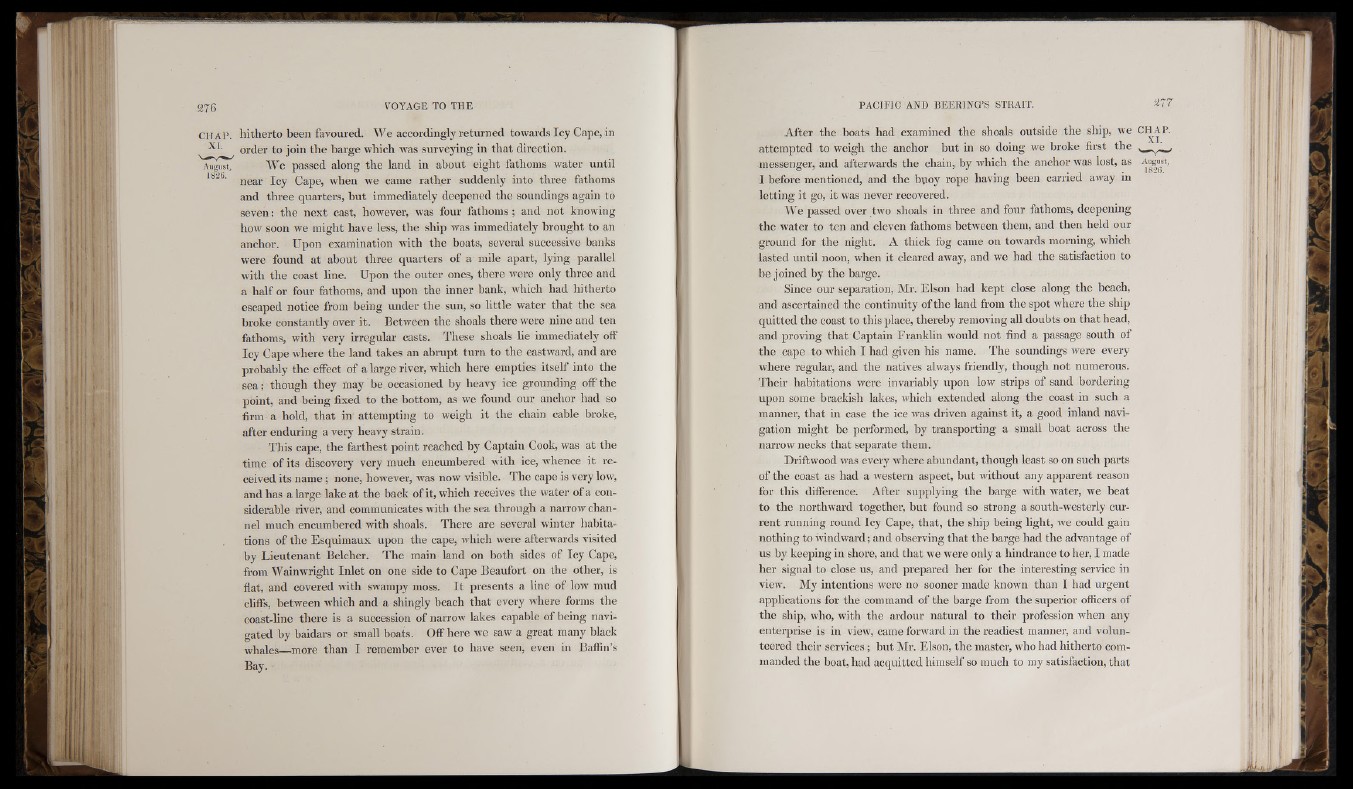
f t . :
hitherto been favoured. YVe accordingly returned towards Icy Cape, in
order to join the barge w'hich was surveying in that direction.
YVe passed along the land in about eight fathoms w'ater until
near Icy Capo, when we came rather suddenly into three fathoms
and three quarters, but immediately deepened the soundings again to
seven: the next cast, however, was four fathoms ; and not knowing
how soon we might have less, the ship w'as immediately brought to an
anchor. Upon examination with the boats, several successive banks
were found at about three quarters of a mile apart, lying parallel
with the coast line. Upon the outer ones, there were only three and
a half or four fathoms, and upon the inner bank, w'hich had hitherto
escaped notice from being under the sun, so little water that the sea
broke constantly over it. Between the shoals there were nine and ten
fathoms, with very irregular casts. These shoals lie immediately off
Icy Cape where the land takes an abrupt turn to the eastward, and are
probably the effect of a large river, which here empties itself into the
sea; though they may be occasioned by heavy ice grounding off the
point, and being fixed to the bottom, as we found our anchor had so
firm a hold, that in attempting to weigh it the chain cable broke,
after enduring a very heavy strain.
This cape, the farthest point reached by Captain Cook, was at the
time of its discovery very much encumbered with ice, whence it received
its name; none, however, was now visible. The cape is very low',
and has a large lake at the back ofit, which receives the water of a considerable
river, and communicates with the sea through a narrow channel
much encumbered with shoals. There are several winter habitations
of the Esquimaux upon the cape, which were afterwards visited
by Lieutenant Belcher. The main land on both sides of Icy Cape,
from Wainwright Inlet on one side to Cape Beaufort on the other, is
flat, and covered with swampy moss. It presents a line of low mud
cliffs, between which and a shingly beach that every where forms the
coast-line there is a succession of narrow lakes capable of being navigated
by baidars or small boats. Off' here we saw a great many black
whales—more than I remember ever to have seen, even in Baffin’s
Bay.
iUi r
PA CIFIC AND BE ERING’S STRAIT. 277
After the boats had examined the shoals outside the ship, we C H A P .
attempted to weigh the anchor but in so doing w'e broke first the
messenger, and afterwards the chain, by which the anchor w'as lost, as
I before mentioned, and the buoy rope having been carried away in
letting it go, it was never recovered.
YY'"e passed over two shoals in three and four fathoms, deepening
the water to ten and eleven fathoms between them, and then held our
ground for the night. A thick fog came on towards morning, which
lasted until noon, when it cleared away, and we had the satisfaction to
be joined by the barge.
Since our separation, Mr. Elson had kept close along the beach,
and ascertained the continuity of the land from the spot where the ship
quitted the coast to this place, thereby removing all doubts on that head,
and proving that Captain Franklin would not find a passage south of
the cape to which I had given his name. The soundings were every
where regular, and the natives always friendly, though not numerous.
Their habitations were invariably upon low strips of sand bordering
upon some brackish lakes, which extended along the coast in such a
manner, that in case the ice was driven against it, a good inland navigation
might be performed, by transporting a small boat across the
narrow necks that separate them.
Driftwood was every where abundant, though least so on such parts
of the coast as had a western aspect, but without any apparent reason
for this difference. After supplying the barge with water, we beat
to the northward together, but found so strong a south-westerly current
running round ley Cape, that, the ship being light, we could gain
nothing to windward; and observing that the barge had the advantage of
us by keeping in shore, and that we were only a hindrauce to her, I made
her signal to close us, and prepared her for the interesting service in
view. My intentions were no sooner made known than I had urgent
applications for the command of the barge from the superior officers of
the ship, who, with the ardour natural to their profession when any
enterprise is in view, came forward in the readiest manner, and volunteered
their services ; but Mr. Elson, the master, who had hitherto commanded
the boat, had acquitted himself so much to my satisfaction, that
I i